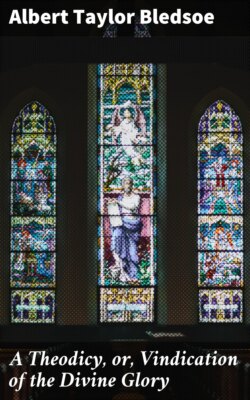Читать книгу A Theodicy, or, Vindication of the Divine Glory - Albert Taylor Bledsoe - Страница 5
На сайте Литреса книга снята с продажи.
The Scheme Of Necessity Denies That Man Is Responsible For The Existence Of Sin.
ОглавлениеTable of Contents
Ye, who live,
Do so each cause refer to Heaven above,
E'en as its motion, of necessity,
Drew with it all that moves. If this were so,
Free choice in you were none; nor justice would
There should be joy for virtue, woe for ill.—Dante.
The doctrine of necessity has been, in all ages of the world, the great stronghold of atheism. It is the mighty instrument with which the unbeliever seeks to strip man of all accountability, and to destroy our faith and confidence in God, by tracing up the existence of all moral evil to his agency. “The opinion of necessity,” says Bishop Butler, “seems to be the very basis in which infidelity grounds itself.” It will not be denied that this opinion seems, at first view, to be inconsistent with the free agency and accountability of man, and that it appears to impair our idea of God by staining it with impurity. Hence it has been used, by the profligate and profane, to excuse men for their crimes. It is against this use of the doctrine that we intend to direct the force of our argument.
But here the question arises: Can we refute the argument against the accountability of man, without attacking the doctrine on which it is founded? If we can meet this argument at all, it must be either by showing that no such consequence flows from the scheme of necessity, or by showing that the scheme itself is false. We cannot meet the sceptic, who seeks [pg 034] to excuse his sins, and to cast dishonour on God, and expose his sophistry, unless we can show that his premises are unsound, or that his conclusions are false. We must do the one or the other of these two things; or, whatever we may think of his moral sensibility, we must acknowledge the superiority of his reason and logic. After long and patient meditation on the subject, we have been forced to the conclusion, that the only way to repel the argument of the sceptic, and cause the intrinsic lustre of man's free-agency to appear, is to unravel and refute the doctrine of necessity.
If we could preserve the scheme of necessity, and at the same time avoid the consequences in question, we may fairly conclude that the means of doing so have been found by some of the illustrious advocates of that scheme. How, then, do they vindicate their own system? How do they repel the frightful consequences which infidelity deduces from it? This is the first question to be considered; and the discussion of it will occupy the remainder of the present chapter.
